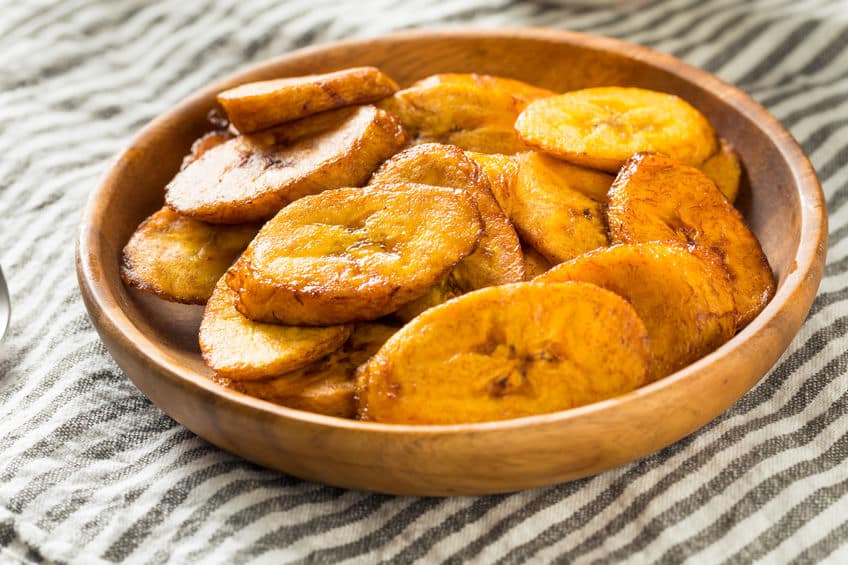By John Salak –
It is easy to confuse plantains with bananas. They look similar, ripen in the same way, they are genetically related and both remain nutritional power houses. That’s where the similarities end. Think of the standard banana as a dessert or a fruit that is eaten raw. Plantains instead are more of a vegetable that is boiled, baked or fried before being served up usually as an appetizer, snack or side dish.
Ultimately, bananas may be more popular, especially in the U.S., but plantains now draw growing legions of devoted worldwide followers thanks to their unique taste, versatility and incredible health-supporting payback.
Plantains do change as they ripen and become a bit sweeter. But they are larger, tougher and starchier than bananas with much thicker skins, which is why they are usually cooked as a fritter called tostones, sliced thinly and fried into chips or boiled and mashed into a seasoned side dish. Very ripe plantains can be used to make a sweeter dish known as maduros, which involves frying or baking dark plantains until their outsides caramelize.
Regardless of how they are served, plantains are loaded with nutrients and vitamins that are good for a whole lot of what ails people today.
They are low in fat and high in carbohydrates and fiber. In fact, one cup of baked plantains has 239 calories, virtually no fat, almost 58 grams of carbohydrates and over 3 grams of fiber. It also holds respectable amounts of Vitamins A, C, B6 and magnesium. When it comes to potassium, plantains even manage to outdo bananas.
If this isn’t enough, one recent study found that plantains have compounds, such polyphenols and flavonoids, which act as antioxidants that help fight free radicals that can cause cancer. A somewhat earlier study noted that swapping out just 10 percent of wheat flour with plantain flour can significantly increase the antioxidants and fiber in baked cookies.
Vitamins and nutrient listings are more than just impressive. They can translate into significant health benefits. A diet rich in fiber, for example, can help prevent heart disease, diabetes, diverticular disease and constipation, medicalnewstoday.com reports.
The site also noted the Vitamin C supports immune systems, while B6 reduces cardiovascular risk and can boost a person’s mood. The potassium in plantains is also a godsend for supporting a person’s heart, nerves and muscles. It is particular useful in keeping blood pressure in check and lowering the risk of stroke.
Facty Health, an independent website, also heralded the benefits of plantains, but went beyond simply noting they were an excellent source of potassium, fiber, vitamins and minerals. It stated by citing that baked plantains chips are a healthy alternative to salty, fried potato chips.
It didn’t stop there, however. It reported that plantains support healthy eyesight thanks to its Vitamin A, serve as a natural diuretic to battle kidney and bladder problems, and can ease menstrual discomfort and bloating. The iron in plantains can also fight anemia.
While undoubtedly a health food, individuals looking to lose weight need to be mindful of portions and cooking methods when dealing with plantains because of their calories and high amount of carbohydrates.
Fortunately, given its culinary versatility, there are plenty of ways to prepare and enjoy plantains—all while reaping the benefits of the other banana.











